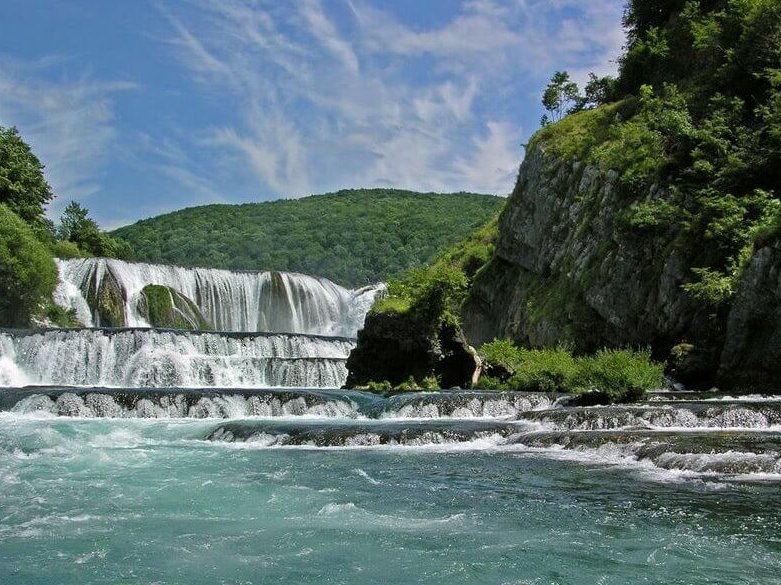Azra Hromadžić Produces “Labor of Love” in New Book Release
Azra Hromadžić, former Humanities Center faculty fellow (2020-2021), offers a multi-layered exploration of what she describes as a “riverine citizenship,” drawing on history, politics, memories and love in Riverine Citizenship: A Bosnian City in Love with the River.

In sixth grade, Azra Hromadžić started “writing” a book, though she might have not realized it at the time.
The memories young Hromadžić formed while growing up near the Una — a river winding through Bihać, a town in northwestern Bosnia and Herzegovina — became the foundation of her 2024 release, Riverine Citizenship: A Bosnian City in Love with the River.
“I remember looking in the river and saying to my friends, if I ever have a daughter, if I'm going to name her Una,” said Hromadžić. “I think in that instance, I symbolically gestured towards the importance of this river to me, but also all of my friends understood why I had that desire, because that river was equally important to them.”
Riverine Citizenship: A Bosnian City in Love with the River, is a “love letter,” a “grief letter” and a form of activism, all in one. Weaving together complex emotions and theoretical frameworks surrounding the Una, Hromadžić’s book constructs a concept she calls a “riverine citizenship.”
The term “riverine citizenship” might strike specific eco-nationalist associations — such as land and territory that belongs to some identity groups based on birthright, or beliefs in pre-political rights to land — but Hromadžić takes a whole new perspective on citizenship. Instead of something national and territorial, a “riverine citizenship” is a place-based, capillary-like relationship that one has to their environment; a relationship of which carries the complicated hallmarks of human connection: it can be shaped by power dynamics, it can compel obligations, and perhaps most significantly, it can be both nourished and threatened by love.
Love is a connective thread of this book. Not only does Hromadžić describe the book’s creation as a “labor of love,” but love also acts as a framework for understanding the political nature in which humans care for, engage with, intervene with, and even destroy the river.
Drawing from feminist theory and authors like bell hooks, Hromadžić explores her own off-road map of love, describing it as something that is not necessarily romantic, not naïve and not entirely innocent — but something can be used as a “compass” to orient us in the world as social and political beings.
“I'm inspired by theories of love that focus on its political potential. However, I was more interested in how love looks ethnographically,” said Hromadžić. “How does it move as an ethnographic object? What does it look like? What does it smell like? What does it appear like? How do people make sense of it? How do they explain it?”
Hromadžić describes her book as “eclectic,” a fitting term for its multidimensional approach that expands beyond traditional anthropology. She blends personal recollections of growing up by and swimming in the river, a broad spectrum of theory, sensorial experimentation, and even chemistry, physics and biology to supplement her understanding of the river.
“I flirt with fiction, I flirt with political theory, I flirt with anthropology, I flirt with ecology and political ecology,” said Hromadžić. “So I'm very promiscuous in that way, in terms of how I employ theory, because the Una and the book about it guided me to go in all these directions.”
Due to the recent rise in touristification around the Una River, Hromadžić devotes an entire chapter to tracking the cumulative destruction of the Una by pollution and the cement-filling of riverine beds and banks. In this way, the book — with its medley of research and multifaceted exploration of what a riverine citizenship entails — becomes a call to action. Along with bringing awareness to the present harm the Una faces, Hromadžić also provides a new way of navigating the issue — a way that intertwines politics with history, with science, with memories and ultimately, with love.
“The hope is to remind people what really matters and how fragile it is; how love has many sides. We really have to be mindful of how we act in the name of love, and what effect that action has…and I hope this can give people political vocabulary, space, courage, and hope to act differently,” said Hromadžić. “So, how do we again reclaim space of citizenship from space of touristificaion and consumption, and how do we return to practices of riverine citizenship as a site of our identification?” Simply put, how do we turn from consumers [back] to citizens
Hromadžić invites us to think of our own relationships with the landscapes that shape us. From rivers, to mountains, to oceans — we all might be able to find a form of “riverine citizenship” in our lives.
- This book was published with support from CNY Humanities Corridor Working Group, LLC39: War Ecologies.
- View the Corridor Publications page for more details on the book.
